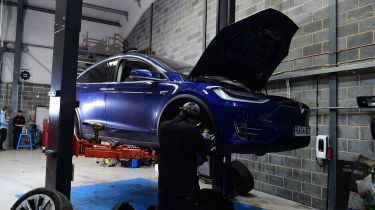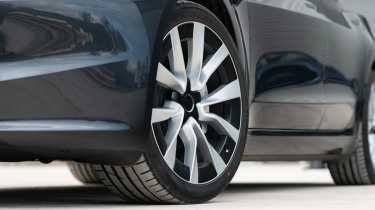Electric car running costs: tax, insurance and maintenance explained
How much do electric cars cost to run? It’s one of the big questions asked by EV buyers and we have the answers…

Electric cars have exploded in popularity in the UK over the last few years thanks to an increase in affordability, lower running costs, as well as a healthy dose of manufacturer incentives. But how much does it cost to run an electric car? This guide covers all the costs when it comes to taxing, insuring and maintaining an EV.
You might assume that because list prices of electric cars are higher than their petrol or diesel-powered equivalents, then they must be more expensive to run, maintain and insure. However, once you’ve made the initial outlay in buying an electric car, you could actually start to claw money back, as EVs generally have lower running costs and lower routine servicing costs.
Insurance costs can also be cheaper, but it’s worth checking before you buy.
Depreciation is also a factor to consider as part of electric car ownership, especially as many models will lose value at a much faster rate than their petrol or diesel counterparts. This is most drastic if you buy a brand new electric car as a private buyer, but retained values are improving as list prices come down.
This is great news if you’re shopping around on the used car market, though, as there could be plenty of electric car bargains to choose from. If you’re looking to buy a used EV, Auto Express can help you pick the right one, while also helping you sell your car in the process.
Below, we examine the main aspects that make up the total cost of electric car ownership, with the exception of charging, efficiency and fuelling costs versus petrol or diesel cars, which you can read more about in detail here.

How much do electric cars cost to service and maintain?
Compared with their petrol and diesel-powered counterparts, electric cars generally work out cheaper when it comes to servicing and maintenance. This is largely because they have fewer moving parts, and fewer items which are prone to wearing out over time.
Real savings come when replacing parts after the warranty runs out. Electric cars don’t need oil filters or spark plugs, and have no cambelts or similar service items that can be fairly expensive to replace at each service interval on internal combustion cars.
Most regular electric car service plans focus on ensuring the battery, high-voltage systems and electric drivetrain work as intended. EVs usually have a cooling system with fluid that needs to be changed from time to time, while many also have a heat pump that will generally need yearly attention.
Brake discs, pads and fluid will need to be replaced as required just as with a petrol or diesel, while the rest of the running gear generally remains conventional on most EVs. Suspension usually comes courtesy of shocks and springs or more complex air systems.
The lack of comparative complexity compared with an internal combustion car generally means fewer labour hours and much more generous service intervals, all of which combine to cut costs and the amount of time the car is likely to spend in the workshop.
While unlikely to be an issue encountered by most owners, electric car batteries are famously expensive to replace if not covered under the manufacturer warranty. The same could be said of a faulty petrol or diesel engine beyond repair, however.
Can independent garages service electric cars?
If your electric car is still within its manufacturer’s warranty, you’ll want to get it serviced and repaired at the main dealership. However, once the warranty is up, you can get it serviced at any dealer of your choosing.
Due to the high voltage nature of electric cars, not all independent garages have the right equipment, or are yet able to undertake servicing on electric cars. Of course, as electric cars become more common on British roads, more service centres will be prepared and able to accommodate them.
According to the Institute of the Motor Industry, as of 2024, around 24 per cent of workshop staff were accredited to work safely with electric cars. It seems likely that number will increase as more EVs enter the UK’s used car stock.
How much do electric cars cost to tax?
Fully electric cars used to be VED road tax exempt, but this is no longer the case.
The rate of tax an electric car will pay will depend on when the car was first registered. If your EV was registered after 1 April 2025, the first year vehicle tax rate is set at £10, rising to the standard rate of £195 from the second tax payment onwards.
If an electric car was registered between 1 April 2017 and 31 March 2025, the standard rate of £195 per year will apply.
If the car was registered after 1 March 2001 and before 31 March 2017, the tax rate will be £20 per year.

Electric vehicle tyres
Due to the weight of batteries, EVs are often heavier than their petrol or diesel counterparts. Add the instant torque and increased performance levels into the equation and electric cars are likely to wear through their tyres at a quicker rate. This is where EV tyres come in.
There is no law or rule stating that you must fit EV tyres to your car, but these are specifically designed to cope with the unique demands of an electric car and are constructed to be much more durable than regular tyres.
EV specific tyres are slightly more expensive than regular rubber, but the increased durability and range should help even the costs out over time. You can learn more about EV specific tyres here in this handy guide.
Are electric cars any more expensive to insure?
While servicing, fuel and tax costs are usually cheaper for electric cars than for conventional vehicles, electric vehicles are generally more expensive to insure. This is partly because repair costs can be higher, and EVs are generally quicker than a similar small-engined petrol car.
Our research found that a Tesla Model 3 was around 87 per cent more expensive to insure than an petrol-powered Audi A4 2.0 TFSI, although less powerful EVs commanded much lower premiums over their traditional counterparts. You can see a range of our electric car insurance comparisons here.
Ready to buy an electric car? We’ve rounded up the best electric car deals currently on the market…
Your electric car questions answered
- Electric car FAQ
- Should i buy an electric car?
- What’s the best way to buy an electric car?
- Is a hybrid, plug-in hybrid or electric car right for me?
- Should i buy a used electric car?
- Can i get a plug-in car grant?
- How is electric car range calculated?
- How much do electric cars cost to charge?
- How long do electric car batteries last?
- What happens to old electric car batteries?
- Should i get a heat pump on my electric car?
- What are fast charging and rapid charging?
- Should i get a home electric car charger?
- Can i tow with an electric car?
- Is wireless electric car charging the future?
- What’s the history of the electric car?








